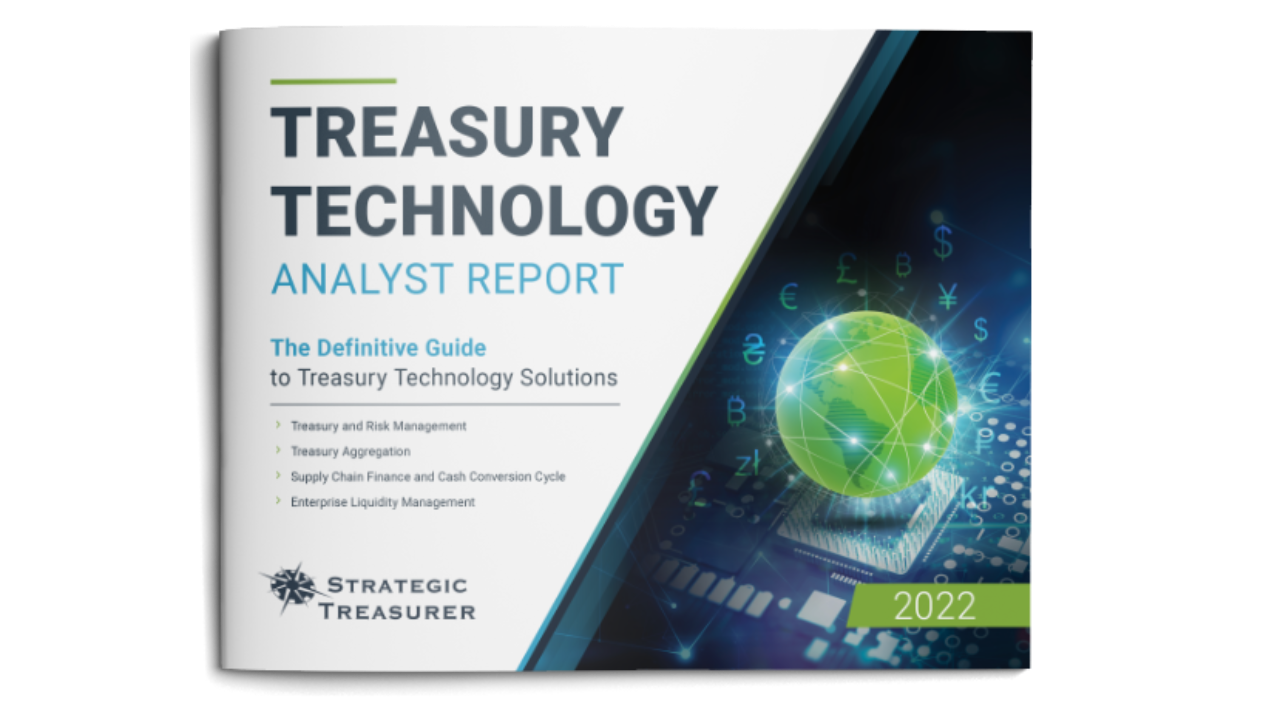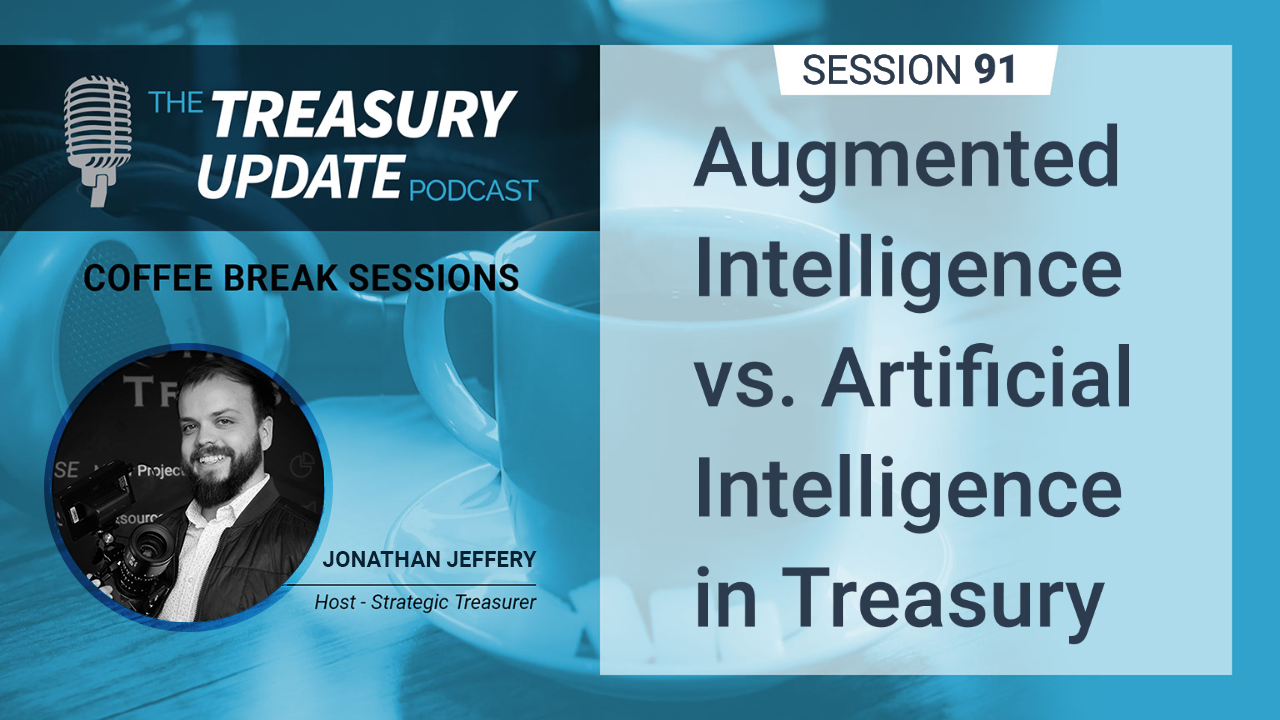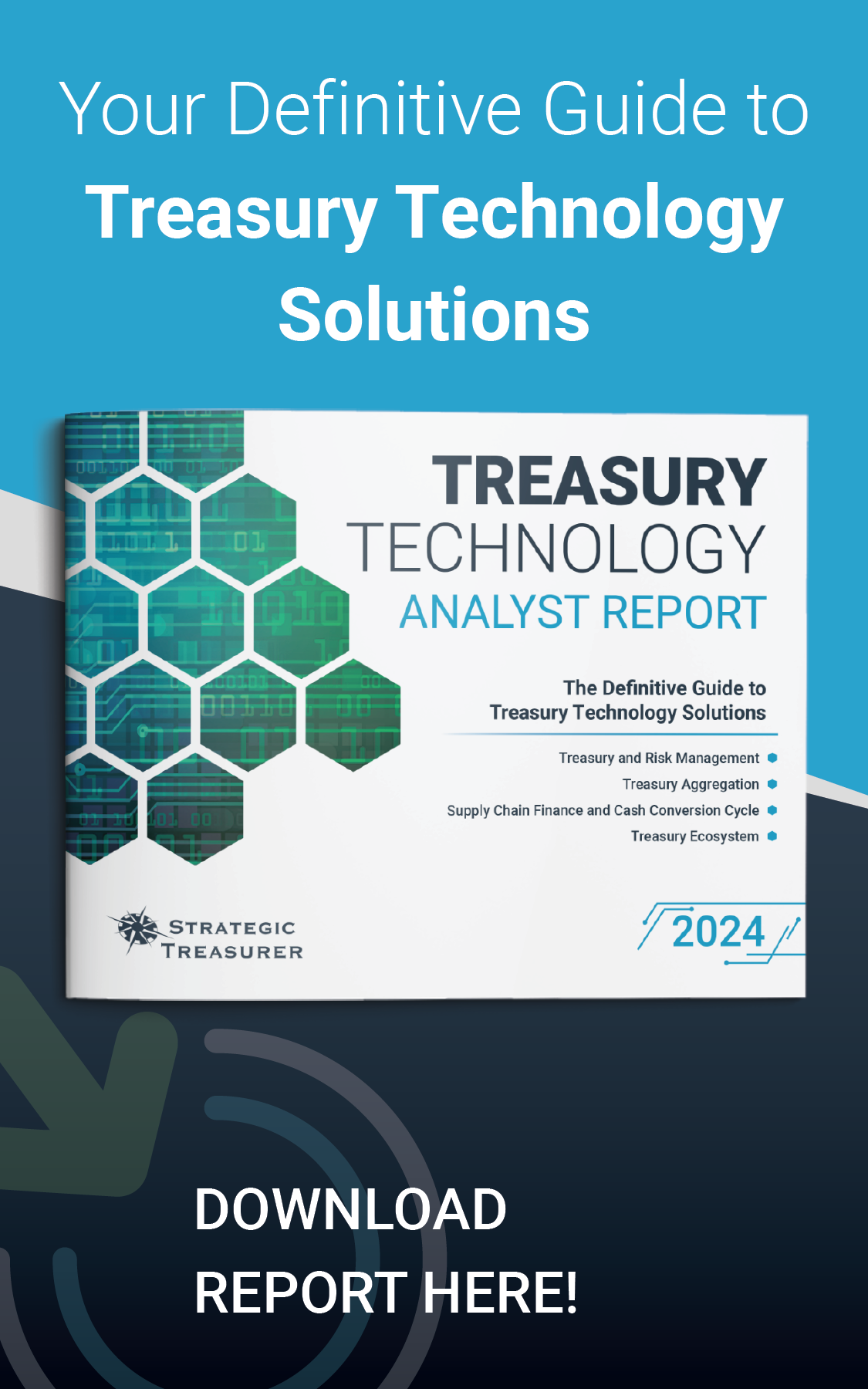
Episode 269
AI’s Current and Future Impact on Treasury
Have you been staying up to date on how artificial intelligence is transforming the landscape of treasury operations? Join us in today’s discussion as we explore AI’s current and future impacts with Royston DaCosta, Assistant Treasurer of Ferguson PLC, and gain insights into technology’s evolving role in shaping the finance world.
Speakers:
- Royston DaCosta, Ferguson PLC
- Craig Jeffery, Strategic Treasurer
Host:
Craig Jeffery, Strategic Treasurer


Speaker:
Royston DaCosta, Ferguson PLC


Subscribe to the Treasury Update Podcast on your favorite app!
Episode Transcription - Episode # 269: AI's Current and Future Impact on Treasury
Announcer 00:04
Welcome to the Treasury Update Podcast presented by Strategic Treasurer, your source for interesting treasury news, analysis, and insights in your car, at the gym, or wherever you decide to tune in.
Craig Jeffery 00:18
Joining me on this podcast is Royston DaCosta, who’s the Assistant Treasurer of Ferguson PLC. Welcome to the Treasury Update Podcast. This is Craig Jeffery, I’m your host today. By way of background, artificial intelligence is certainly occupying our thoughts and conversations in an increasing measure. And I think we’re all seeing the rapidly scaling capabilities across a range of activities and disciplines. We’re using these tools at least in our personal lives, if not our business lives. And in this episode, we’ll discuss how AI is changing treasury and how that change may look over time. After nearly a year break since our last joint podcast. I’m happy to welcome Royston DaCosta back to the Treasury Update Podcast. Royston, it’s good to have you back.
Royston DaCosta 01:01
Well, thank you, Craig. As always, it’s a joy to be able to not only I know your listeners can see, but I can certainly see it. But it’s great. It’s really good to catch up. And as you said, time passing. It’s cliche, but it’s so true. Exciting times for us in Treasury really is I mean, where do we start? Where do we another thing, we’ve got enough time to go through everything that’s happening in Treasury, but certainly we can cover the main point. So I’m looking forward to this session with great enthusiasm.
Craig Jeffery 01:30
Royston, and certainly, you know, for those who may not have listened to Royston on this podcast or other podcast channels, he certainly is a well known speaker, I guess I think of I think of you, Royston, as a treasury futurist. I always enjoy our prep talks and our actual podcast recording. So yeah, maybe get start Royston with the you know, what, what do you see happening? With AI? There are certainly tools that are becoming available to almost everybody this democratization of these AI tools, not just for the cyber elite. But for everyone. How is this democratization the tools playing out? Generally? And maybe maybe, as we think about it from a business or Treasury perspective?
Royston DaCosta 02:17
So Craig, let me start by saying I’ve been in Treasury for 35 years, right. So I have really come from a period and a time where I’d say compared to what we have today to quality really didn’t exist. In fact, even when I first joined Ferguson, which was we then called Walmsley, 21 years ago, we have very little technology in place in terms of no TMS, no cash pooling No, any of the 13 cloud based solutions we have today were existing, either existed then or where we we were not engaged with. And we were just using spreadsheets like most companies were at the time. So I like also the term and you’ve coined it really well, democratisation of AI, because from my perspective, and I don’t want to be disingenuous, but I’m going to use the quote by someone pretty famous. I think we all recognize Albert Einstein said, If you can’t explain it simply, you don’t understand it well enough. And I generally, I like to approach things from a very simplistic perspective in terms of whether it’s technology, whether it’s treasury, I get there very complex routines, and, you know, sort of theories out there. But frankly, when you’re looking at technology, you’ve got to understand it from the you know, how’s it solving your problem? Is it solving a problem for a start? You know, I don’t want a solution that’s not solving a problem. I think, for me AI, a lot of buzzwords that we’re using technology API’s and so on so forth, didn’t really seem to answer or kind of solve anything for me. I mean, it’s important, I get it. And it’s used by a lot of vendors and fintechs. So, to answer your question, the democratisation of AI, I think Microsoft in terms of what they’re bringing out which is called Copilot is a groundbreaker in kind of bridging that gap, I think, and I think you’ll see that and probably don’t realize it in some of the apps we use. They include AI and so we’re already engaged using AI and I’m sure everyone’s heard of chatGPT, which is also becoming extremely powerful. But let me focus a bit more on on what Microsoft does and how that’s going to impact and how it’s helping Treasury in particular. So one of the things that Mirosoft is doing with this copilot is that they’re rolling it out across all the so all the applications, that Excel, Word, PowerPoint, so on so forth. And what you are able to do from what I’ve seen so far, is you’re able to use the air technology to create effectively an automated process for could be anything from, you know, sort of how you would look for particular email that you might want to receive an alert for on your mobile phone call. Or it could also be to do with a simple process. And I think most of us have some manual processes that still exist, whether it’s, you know, involving maybe something like a share buyback, where someone has to go in and enter manual payment, and then request approvers to prove that payment. And there’s a few bits of exchange that tend to take place there. Well, you could potentially use this solution from Microsoft to automate some of that process. In other words, an alert would come out from the system saying, okay, is a payment been entered or required here, the approvers, then approve the payment, and can actually generate an alert or a confirmation for that matter, in that process to then go to that next step. So just a broader view, as I said, with, you’ve got Excel, you’ve got word, you’ve got PowerPoint, some of the main applications, I certainly use, all of these can and are being used under the Microsoft umbrella to go to that next level of automation and technology. And this doesn’t require you to be a programmer, I have to emphasize that that’s so important. Certainly, from my perspective, I know that there are treasures out there that have, and kudos to them for getting involved in Python and machine learning, and so on and so forth. And that’s great. But then there are lots of other people or perhaps not so I would say with that type of technical expertise, was, I think, Microsoft what they’re doing, they’re saying, let’s let us do the heavy lifting for you. But give you the benefit of that. And just a caveat here, I’m not I don’t have any shares in Microsoft, and I’m particularly trying to sell anything to them myself, but I do believe deputy particular product is a lot of people and companies do use it. It’s it’s offering a lot of benefit.
Craig Jeffery 06:56
You know, as you’re talking about things like rules that are enhanced with artificial intelligence, I mean, we’ve used workflow rules with our email, there might be auto completion, many of us have played around with some of the robotic process automation tools that you take steps that are done very manually, and you build them into a bot, that will take those steps. And that was like, we have to build everything from the from the detail level, like you said, a programmer, whether it’s use a macro using Visual Basic, or, or Python, is this Microsoft copilot, do you see this as it’s a, it’s a combination of the brains of AI supporting some of the bots or the rules that automation, it’s helping, it’s like a combination, it’s a combination of those things, because sometimes we think about AI as being like, it can detect patterns, it can do things, but you’re also bringing it into the you know, what Microsoft’s doing with this, it makes all of our jobs, easier workflows, filters, processes, what do we need to focus on?
Royston DaCosta 07:58
Exactly, and I think there is a level of complexity that you can go to, if you’re that way inclined, and I’m sure, you know, mice will be more than happy for the users to go into that, you know, the kind of the Academy of trying to, you know, you can go back actually go back to when macros and they still are, frankly, can be quite complicated. I’ve come across people that use macros, extensively, and some way, you know, help to automate process to certain degree. What we’re seeing here today is a game changer in respect that the, the audience I think, is wider, and it doesn’t restrict or limit the use of that functionality, to, you know, sort of the level of expertise or, or appetite that person might have for getting into kind of writing programs. So let me give you some examples here. What Mike’s for doing in terms of co pilot and you know, one of the things about AI and you’ve probably seen the chatGPT, we go in and you can ask it a question and say, Okay, how do I do this? And how do I that? Well, they’ve built that or integrated that into the applications. So effectively, you can take, let’s say, a spreadsheet, a table of some data. And you can ask Copilot to put together a presentation based on that data. And it does it for you. And the same kind of thing. You could also say, for example, you want to automate the process that I just described, but you’re not sure how to go about doing it in terms of using the the tools that they’ve got, and in and this is something on the kind of tool they got called Power Apps, automate, power automate, and you can ask it set you can say to it right, I want you to automate an alert to me whenever an email is sent by say you great to me voice intercom. And Microsoft does it for you. They create this process, which says okay, whenever an email comes through into Outlook, you will get an alert on your mobile phone that tells you Craig, or maybe CEO, whoever it is that you want to be. And that’s just a very simple example. But you can, the point being is that AI is now playing a part in helping us to improve our workflow and to become more efficient, because at the end of the day, I guess, you know, as much as I’m sure, there are certain places that can’t be automated, let’s say. But I think a lot of the processes that have been automated through technology and some of the solutions, we have some of the internal processes, we have still got a way to go. So I think the last one I’ve mentioned on this also is quite interesting and quite powerful, I think, which is myself also. And I haven’t tested this fully, but my colleague at work in it has allowed you to create your own app. So you could also then part of that process, have an app set up on your phone. So if you’re looking at internal approvals, for argument’s sake, like I was describing earlier, your colleagues, your treasurer, you’ll see if the CFO could effectively get into the app, and confirmed that they’ve complied with a particular step of that process. You’ve just automated. That, to me is how much value we’ve got to gain from from what they’re doing at Microsoft.
Craig Jeffery 11:13
The Royston app. I like it.
Royston DaCosta 11:16
Now you’re giving me ideas.
Craig Jeffery 11:19
That is interesting and hadn’t heard about creating your own app to run on your mobile phone? And then, you know, what are the security levels of that right? Well, you you’re comfortable because it’s yours. It’s not something you picked out of the store that may or may not have been vetted. Real it really interesting is you’ve talked about power automate, and what Microsoft Microsoft’s doing with co pilot bringing that into the regular office automation tools we use, how once this has been changing and impacting our work. Also, I want you to describe that, I guess more from a future perspective, what does this mean for the work we do? What will that mean for the workforce? You know, because one of the things just as some additional background for you to mull on is, we’re talking about Treasury people we need more people with, with technology skills in Treasury, not just deep Treasury experience. But those who are particularly adept at the Tech because it’s changing so rapidly, we need to bring those to bear. Is this going to require more of that or require less of that? Because it’s, it’s more available to everybody? So how is How’s work going to change?
Royston DaCosta 12:27
Now, you’re actually right, this, there’s a number of dimensions to this question, frankly, great, because you know, my views. And this is not just my view, this is some of the statistics that I’ve been sharing with you separately around the demographics and you know, the future for the workforce in the in the world, frankly, rather than just in the UK in the West. But I think, from a treasury perspective, there’s an element for sure that as we age, and more people begin to retire and leave the workforce. There’s, I think, a huge risk, frankly, that we’re going to have a shortage. And I think we’re already beginning to experience some of that, not just in Treasury, but in our workforce, generally, what’s very widely known that, you know, this generation Gen Z are not reproducing. And this is not just here in the UK and say, It’s globally, or is it globally? Correction, it’s in most of the West, because a certain ascending continent of Africa is bucking that trend, but they’re not reproducing as as as much as we did our generational previous generations. And so, technology will help for sure in mitigating some of that, but it by no means will address the full shortfall. And so I think governments are already looking at and think the US has particular and certainly UK governments are looking into how to try and attract people that retired back into the workforce, just like the Japanese economy did very successfully, by the way. So there’s an element of that, that I think needs to be considered as much as other aspects, then we don’t get into the political side here, but potentially migration, I imagine and, you know, sort of looking at training up new sort of new entrants and trying to attract, frankly, the next generation into treasury and into the is this this particular industry, but for sure, the people that come into Treasury nowadays, recognize that you have to have an openness and some level of knowledge about technology. I think the important point I would always bring and try and sort of, you know, sort of encourage people in those who are currently in Treasury is be open to the potential solutions out there, like I’ve just introduced in terms of a pilot, because it’s so important that if you don’t kind of look at what’s going on around you, the chances are you’re going to miss it. And you could be left behind. And that’s not just as individuals or as Treasury teams, but it could be as a company as well. And that’s disastrous for any company. I’m sure you’d agree. So the degree to what one should then start thinking about these sort of these these initiatives and these solutions and technology? Can’t they no one’s got enough time to look at everything that’s out there. But I would say, whenever you hear about something like I’ve heard co pilot, when I heard about the API, aggregator, those are sort of initiatives you should not ignore. Because I always try and look for those initiatives that are going to add value, they’re going to make a difference, not just in terms of Treasury, but to the environment I work in and obviously to my company. And if it’s going to add value, then why would I want to look at that. So I feel like this generation, the Gen Z is and obviously now Gen Gen alpha will be coming soon, those born from 2002 onwards, they have pretty much grown up. Only known technology only been used to the smartphone, the digital age and and obviously, you think of a Gen Alpha coming, growing up with AI. So that bar will only go up when it’s in a good way, frankly, in a very good way. Because it means hopefully, that, from a treasure perspective, those processes that we may have accepted for a decade, in some ways, will be questioned. And they asking the question is, why should we be doing these manual, kind of almost inefficient tasks, when you can do them in a more automated, more efficient way? My daughter’s Gen Z. And occasionally, I kind of get into looking at my presentations, and she’ll say to me, Well, you know, you can do this. Now, I thought I I’m not saying I know what you’re doing. But it’s interesting that they have that mindset that they’ve grown up, and she’s obviously gone to university to study. And so she, they’ve been, you know, sort of trained as well, to recognize the quickest, easiest, most efficient way to get to your goal. Now, the byproduct of that could well be and I don’t want this not part of this conversation. But it is important is this whole aspect of, you know, having a balanced work life, which is also kind of a byproduct of the pandemic, but it’s a good thing, it’s a positive thing because it means that hopefully, we can, this generation and the future generation will have a more productive and enjoyable life in terms of being able to balance their work and, and social life in a great way, I think in a much better way than any way I have in my time.
Craig Jeffery 17:29
That’s great. Royston, you know, I don’t know that the Gen Z says Why should I? I think they say I’m not going to do your task. You may not even they say that in their head. And then they they go down the road. And they’re like, I saved two hours of manual nonsense. And I’m doing stuff better for my same same exact concept. Just just funny how they present it now.
Royston DaCosta 17:53
You’re absolutely absolutely. Right. And just on that point, actually, there’s something else. And then again, I know, this is not necessary part of this discussion, but it’s, it’s some of the statistics, I see where Gen Z, they come into job, and they see that it’s not meeting up to their level of expectations, they will walk, there’s no hesitation that they don’t have the same, let’s say, inhibitions, that maybe our generations have weighed a kind of like Job hop or whatever No, for their perspective is it’s you know, there’s an expectation and say, you know, the whole hybrid working and just sort of engagement in technology. But I think there’s an aspiration behind that, frankly, which is, you know, if you can work for a company that does things better, that uses the tools and the technologies that are out there in a more kind of productive, efficient way. How can it be a bad thing? I just don’t see it I a complete I can’t agree with them.
Craig Jeffery 18:47
You know, as you as you said, you could be left behind, you know, or you will be left behind if you’re not doing that. And then, you know, from an individual perspective, you will certainly suffer from that I think. And you may be left behind you may become obsolete in your lack of current skills. Right. But certainly the company’s if you’re not, if you’re not advancing on the the technology side to make things continually improve, your company will be left behind, certainly Treasury will. And so you’re required in other areas to make up for that, as opposed to, like you said, How can I make things better, really important mindset and how it’s changed over time, auto complete, right? When I saw that, like, we can laugh at our phones, like I didn’t mean to say that that’s not what I meant. It was foolish. But we’re finding that in our emails or other systems that it oftentimes completes the sentence. It’s pretty good. And so you just hit I can’t remember what you hit. If you hit enter tab. And you’re like, I’ll take that that language. Probably another topic. You know, every generation complains about the next generation tech. Oh, you don’t you didn’t learn cursive? And I’m like, oh, Why is that useful? You know, it’s like, like, I don’t I don’t see that the need to learn cursive and I’m sure I’ve gotten people upset by that. And same thing with the, it was like using a calculator and being able to use a 10 key where you could type and enter numbers quickly. That’s not necessarily a needed skill. Now, it certainly teaches you. Maybe we could talk sometime in the future about will AI make it so that we stop thinking, the process of writing or coming up with arguments or dialogue is really crucial to order our thoughts. And if we just say, write a paper for me, you get the generic flow and variability from like ChatGPT. But you’re not ordering your thoughts and thinking, right, and so there’s a, there’s a, that seems to me to be a bigger potential shortfall, because that’s, that’s our thoughts as opposed to my skill of my hand and writing cursive.
Royston DaCosta 20:55
They all have that is actually correct, Craig, and it’s an interesting area that you’ve opened up there, because I think what I’ve kind of tried to capsulate is really kind of, let’s say, you’re using that analogy of a stream that looks at the fastest way to certitudes exit or to you know, to go if you like, and I think this is where I see technology now, at least in terms of Treasury, dare I say, not the department probably won’t, the palms that been neglected many ways for years on advancing technology. And I think that’s got a direct link with the banks, frankly, because the banks have not really invested as much as they should have done. But they are beginning to now in technology, and so that’s good. But I would say so there’s an element now where we’re trying to sort of trying to kind of get to that place where, you know, certainly whether it’s payments, or TMS is or some of the solutions we use. They’ve automated those those processes. But when you look beneath that hood, like you’ve just described, and you think about and this is something I’ve always kind of, you know, kind of highlight a lot, particularly when you think of cyber security, it’s so important to have that understanding of how those processes work, and what you have in place and some of the transactions that we use in Treasury, so you never lose sight of, you know, the theory behind those transactions. So there’s that goes without saying. So, like you said, in terms of calculator, that’s an interesting example, because I guess you’re right, this generation probably don’t use calculators and everything kind of pretty much, you know, why would they, in their mind need to use one if it’s, it’s presented to them? And just as much as we probably don’t think twice, about using a search engine? To do most of our planning? If it’s for going on holiday, whatever? Why would you want to go back to the days where you had to pick up a phone or use some sort of directory of some sort to research which company, not sure they even produce those anymore? My point being is that as times change and the tools and life that we need in society progresses to this extent, even if you think of your personal banking arrangement. No, I don’t think I’m sending I’m so used to using my phone and, you know, in my online banking to do all my clients, who goes into bank branch anymore to do their banking, there was a time when that’s the only way you could, but again, the point being is there comes a point in time where these kind of processes if you like, become redundant, almost. I mean, there’s still required for certain things, don’t get me wrong, we don’t get rid of branches altogether. But they’re reduced significantly. I think it’s it’s important that we use them as appropriate. But it’s also important that as a result of what we’re now being able to achieve through being more efficient, we can begin to focus more on being I think, a lot more strategic. I think that’s the game changer for Treasury going looking forward. And that is funny thing that I kind of recollect someone asked me a question, the age old question, this is about probably four or five years ago, brief bandhan. What did I think the Treasury function would look like in 10 years time, and I’m not trying to blow my own trumpet Ukraine, but I, at the time really believed that Treasury would be much more remote, not in the way it is today. I didn’t see that fully. But I did see kind of technology kind of, you know, sort of infiltrating the whole office workspace, as well as you know, our kind of working lives and much more online in terms of how we engage. And from that perspective, it made me then also think that means we can begin to focus a lot more on those challenges that sometimes you don’t have the time to delve into enough depth. Plus, with the technology that’s now becoming more available, it’s quantum technology or AI, or some of the other technologies that are coming up. This will then give us, let’s say, some competitive advantage, if you’re looking to see, you know, how can we make things better, not only for our companies, but in terms of how we’re competing out there in the world, in terms of our competitors, you know, how do we ensure that we’re hedging exposures a lot more closer to 100%, then at the moment, perhaps is not possible to do that. This is some of the areas and then obviously, trying to kind of both a predict the forecast for that inevitable next crisis that, unfortunately, will occur at some point. How do we make sure we’re suitably prepared for that? These are sort of not just lessons learned, but important. Life lessons, I think that not just treasury, but certainly Treasury should be kind of focusing on using the technology that’s become available, and will you continue to become stronger to, to equip us to, to be able to navigate our companies through these uncharted waters that keep coming up?
Craig Jeffery 26:13
Excellent. Royston is as we come to the final thoughts section, they want to hear your final thoughts, but I want to position it perhaps a little differently than we had considered as we as we just talked through some of these points. You know, one of the most over talked about, but useful diagrams is the regular triangle, and then an inverted triangle. And it was like, we want to move from this to that. And the top part of the triangle was strategic. And the bottom part was all operational tasks and, and then you want to move to the inverted triangle where you’re spending more time on the strategic activities, and very, very little on the mundane. And that certainly is the case. But I guess, is AI going to be the end of analysts, the analysts level because that’s going to be mostly taken out or partially taken out? Or is that going to make more powerful analysts? And is this is this the first true opportunity to allow for strategic thinking that we’ve talked about for like you said you’ve been in Treasury for 35 years? It’s been talked about for that entire time, or is it something else?
Royston DaCosta 27:20
Okay. I think on the analyst that, frankly, I don’t think it’s, it’s quite a straightforward that That, to me, what AI is doing is going back to your original point about democratization, it’s opening the whole aspect or kind of quality of analysis to everyone, we’re all effectively going to be how to become or have to be, have to be open to being analysts, because the nature of AI is that it’s offering you a benefit or solution, that to some degree, you’re going to need to be able to analyze and be able to interact with it to a certain degree to be able to utilize it fully. I guess where I really want to go here, Craig is, you know, this question about and it keeps coming up? And it’s I don’t think it’s going to go away, which is will technology make us all redundant? And I think we all know, that’s not going to be the case. It does have an impact for sure. On certain types of roles. And if you look at industries, they can, you know, there’s certain obvious industries, particularly manufacturing, where that’s particularly that’s true. But even then, I would say it’s not a complete elimination of role in some cases, it’s just displacement. It’s a sort of transposing or transferring skills from that particular role or that sector to another to another sector. I mean, in terms of it, when I first looked at cloud based solutions, there was a bit of kind of hesitancy about what that meant for those roles. People felt thinking, oh, gosh, we’re going to be no, actually what happened a lot the it but looking after is began to start looking at SFTP and secure file transfer protocol. And, you know, sort of sportiness in terms of some of the cloud based solution. And of course, they’ve got cybersecurity. So I don’t think it’s necessarily one or the other. So coming on to the analyst bit I think we are all called upon to become more analytical in our in our roles. So just means that it’d be a wider in a wider pool, if you like, for the strategic part goes without saying it would be really pointless, I think from a, you know, from a kind of looking ahead, if we’re engaging all this technology, and we’ve got this data, and then we slipped around us twiddling our thumbs. I mean, it wouldn’t make a lot of sense and certainly not my kind of forte but I would definitely say, you know, we are all caught on I remember coming across treasure, I think one of the UK car manufacturers, and I was being spied. What are you saying then this is going back few years. He said he encouraged his team to build Well, then 20% of the objectives every year, to looking at innovative, innovative solutions. Now, for me, that’s part and parcel of trying to be strategic as well. You know, you’ve got to not just think about what you can do within your own role within your own team and in your own company, but also what other people doing outside of how can you use or perhaps gain from that, and in a sort of try and see whether you can implement some efficiencies in your so I think you’ve got to be more outward looking as well. And the technology we have today, apart from the AI and the machine learning, you’ve got, you know, sort of webinars and calls, you’ve got, you know, sort of podcasts like this, I mean, absolutely. Utilize all these mediums to try and enrich your life so that you can bring more value to your company. It’s an interesting point you bring up I hadn’t really considered this, but I think it is an important point. One of my favorite technologies that hadn’t really hit full full on the Treasury, the metaverse. So here, we’ve got an interesting a rising technology. I mean, it’s already out there doing it wrong, but we’re not using it extensively. Team, Microsoft Teams actually has included already, you looked at seeing the option. And it’s got an immersive option which you can use to basically create an avatar for yourself in a meeting. So I could become now if I wanted to, but on this call, but an avatar, and you could do the same, but crude at the moment, because I didn’t see where that particular value is. But in time, that will become a holographic image that you can actually be in the same room as the other person, a lot more interesting experience there. But of course, alongside that, you’ve then got the other kind of negative aspect of all this technology, which is, you know, identity fraud. So but I do believe strongly luck with every technology that comes out that’s got a lot of good in it. There’s going to be that when you say nefarious activity that goes with it. But that should not stop us from still kind of trying to progress. And I believe that companies like Microsoft and Amazon and Google as well. I investing enough in security to ensure that there’s a level of protection we can we can still rely on. So absolutely, we should embrace this, but always be cautious.
Craig Jeffery 32:19
Thank you so much, Royston.
Royston DaCosta 32:21
Thank you, Craig. Much enjoyed that.
Announcer 32:27
You’ve reached the end of another episode of the Treasury Update Podcast. Be sure to follow Strategic Treasurer on LinkedIn. Just search for Strategic Treasurer. This podcast is provided for informational purposes only, and statements made by Strategic Treasurer LLC on this podcast are not intended as legal, business, consulting, or tax advice. For more information, visit and bookmark StrategicTreasurer.com.
Related Resources
Researching new treasury and finance technology can be overwhelming. Strategic Treasurer has stepped in to help. Explore our definitive guide to the treasury technology landscape and discover detailed, data-based coverage of:
- Treasury & Risk Management Systems
Treasury Aggregators
Supply Chain Finance & Cash Conversion Cycle
Enterprise Liquidity Management







